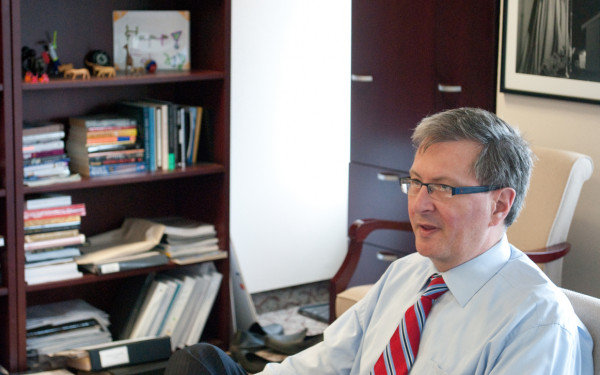Charting a New Academic Course
Senate Approves Five-Year Plan Despite Student Objections
After an hour of debate, Concordia’s Senate voted by secret ballot to adopt a new five-year academic plan for the university, despite rampant student opposition.
In total, 26 Senators voted in favour of the plan, and 19 voted in opposition.
“I understand that the great majority of those who chose to vote against the plan were doing so not so much because they disagreed with the plan as a whole, but because they may have disagreed with portions of it [and also] particularly because they wanted further discussion,” said Provost David Graham.
Most opposition came from student representatives who, following a presentation from Graham at a Concordia Student Union Council meeting last week, had been mandated by Council to oppose the plan, citing concerns regarding financing for graduate students and a possible veto of the plan by Concordia’s next president.
Last week, in an interview with The Link, Graham expressed his disagreement with those concerns, saying of the graduate student issue, “I think it’s good for all of us if we could attract more good students for all kinds of reasons.
“Not just because they attract good faculty, but because they provide great role models for other students.”
Graham also dismissed the possible veto of the plan by the new president, a possibility that had concerned some, saying, “The idea that the next president would come in and just veto or jettison the plan seems absurd to me.”
Graham addressed a few comments to Senator Andy Filipowich, who had addressed the CSU Council following Graham’s presentation.
“I attended that meeting in good faith,” Graham said. “I was staggered to learn via Twitter, within moments of my departure, that a fully crafted motion, elaborate and obviously drafted before I ever set foot in that room, proposing that the CSU oppose the plan, was immediately presented.”
Early in the meeting a motion proposed by students to table the plan for further consultation was voted down by administration and some faculty members.
“We were really hoping to get [the plan] tabled to January, but I think we managed to make our point,” said Chuck Wilson, a Senator and student in the Engineering and Computer Science faculty.
While students had some support from faculty members, they did face opposition from administration members, including interim Dean of the John Molson School of Business Alan Hochstein.
“In a way, I take offense to the students’ belief that the faculty would make a plan that is counter in any way to the students,” he said. “I think it’s probably very difficult for students now to change their vote. I’m sure you’re sort of bound by the vote. If I was a student, I would vote wholeheartedly for the plan.”
Hochstein was rebuked by graduate student Senator Holly Nazar, who asked that he refer to the student members of Senate “as Senators, and not student Senators.”
While the next step for the plan is for it to be voted on by the Board of Governors at their meeting on Nov. 17, Wilson said that students will be “hugely” involved in the implementation phase, should the Board approve the document.
“It’s going to be up to us to make sure that things go through properly. That’s going to be a big challenge for all of us.”

_900_600_90.jpg)


webedit_600_375_90_s_c1.jpg)

_600_375_90_s_c1.jpg)
